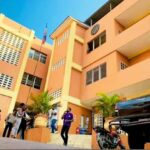Summary: No electricity. No parliament. No security. In these conditions, it is difficult to live, even more difficult to work, in Haiti. Here’s how GPJ journalists do it.
Reporter Byline: GPJ Americas Team
Photo Caption:
Photo 1: The sun sets over the Cavaillon River in Maniche, Haiti. Although far from the capital, the commune was not spared the effects of the chaos in Port-au-Prince.
Photo 2: Residents buy goods under streetlights in Maniche, Haiti. The Maniche Youth Union for Development installed lights to address the lack of electricity after an earthquake in August 2021.
Photo 3: Residents of the southern district of Martissant take a dangerous road to reach Port-au-Prince. Insecurity has worsened in the Martissant region, where armed gangs occupy sections of National Route 2, a major highway that connects four provinces of the country.
Photo Byline: Rose Hurguelle Point Du Jour, GPJ Haiti
Anne Myriam Bolivar, GPJ Haiti
Illustration Credit: Matt Haney, Global Press Journal
Article « This article was originally published by Global Press Journal »
For years, headlines have claimed that Haiti is “on the brink of collapse.” But when does a country reach the point of collapse?
Is it when elections are postponed indefinitely? When the president is assassinated? Or is it when armed groups take over the capital? Or when foreign countries evacuate their diplomatic personnel?
All of this happened in Haiti, and many Haitians feel like their country has already collapsed. In 2023, armed groups have murdered nearly 5,000 people and kidnapped 2,490 others. According to the International Organization for Migration, the violence has forced some 362,000 people, mainly in the capital, to flee their homes.
Centuries of foreign intervention and decades of dependence on international aid, along with devastating earthquakes and hurricanes, have put Haiti squarely on the list of fragile states, according to the State Index fragile 2023, which ranks Haiti 10th, between Chad and Ethiopia, with a score of 102.9 out of 120.
For five Global Press Journal journalists, covering their country has never been more difficult.
Reporters Without Borders, in its 2023 report, ranked Haiti 99 among 180 countries in terms of press freedom, or 29 places lower than the previous year. The report notes that journalists in Haiti suffer from “a severe lack of financial resources, an absence of institutional support and difficulties in accessing information.”
Years of political instability have ravaged the country’s infrastructure and already failing communications, transportation and health services networks have created increasingly difficult working conditions for journalists. But Global Press Journal journalists across the country continue to move forward.
Here, they describe the challenges they faced while reporting on a country with an uncertain future.
WHERE GANGS RULE MASTERS
By Anne Myriam Bolivar
Working as a journalist in Port-au-Prince means being prepared for anything.
I personally know the risks of working as a journalist here. I survived a kidnapping attempt in 2021.
Today, at least 23 armed groups operate in the metropolitan area where I live. The threat of being kidnapped or hit by stray bullets seems constant, and gang violence devastates our communities. According to the IOM, 94,821 people left the capital for the provinces between March and April this year.
In 2022, I was part of a group of journalists who went on a mission together, to look out for each other. But today we can’t even do that. Many journalists have left and for six months the power supply has been cut off and internet networks have been unstable, making our work more difficult than ever.
But I refuse to stop my reporting.
Safety is of course my main concern. I must constantly assess the risks of violence, physical assault and kidnapping in the field. I learned to carefully observe my surroundings. Before leaving, I browse journalists’ WhatsApp groups and listen to the radio to find out which roads are the safest. It changes every day. Every day I develop strategic security plans, once reserved for major stories.
I dream of the day when things return to normal in Port-au-Prince, a city that I love and which was once full of life: the sound of car horns, the scrum of public transport and the hordes of students boarding buses to go to school.
Every May there was a major gastronomic fair, where exhibitors presented delicacies, a glimpse into Haiti’s rich mosaic of cultures. Commerce and creativity flourished; public squares like the Champ de Mars, in the heart of the capital, were popular places for cultural and religious events. As a football fan, I loved going to watch the championship matches at the Sylvio Cator Stadium.
But in a city where gangs reign supreme, all that too has been hushed up.
OFFLINE AND DISCONNECTED
By Rose Hurguelle Point of the day
In Maniche, where I live, we are far from the chaos of Port-au-Prince, but all aspects of the crisis still affect us.
On August 14, 2021, an earthquake destroyed most of Maniche. Essential services have still not been restored.
In the past, we had electricity 24 hours a day. Today, we don’t have any at all – and haven’t for three years.
I pay to use generators to charge the tools I need: my phone, my laptop, and my camera. But that’s not the hardest part. Without the Internet, I can’t work. And the Internet rarely works here.
I subscribe to two internet providers, Digicel and Natcom, but often both go down at the same time, paralyzing me and making me unable to download articles and photos.
Starlink Internet is available, but the cost is high and it requires electricity to run it. On average, it costs me 2,820 Haitian gourdes, or about $21, per month to access a lame connection. A government survey conducted in 2023 among 83 households in Cap-Haitien, Haiti’s second-largest city, estimates the average monthly household income at around 34,888 gourdes ($262), making the Internet is a privilege reserved for a few. Data from the International Telecommunications Union in 2019 showed that less than 40% of Haitian households have access.
Finding an Internet connection often involves great risks. Sometimes I take a motorcycle taxi for 500 gourdes, or about $4, to Les Cayes, a
town located approximately 23 kilometers (14 miles) away. There I connect to the Internet with a friend’s Starlink system. But achieving this is no easy task.
On a recent trip, I passed through at least seven barricades, made up of a hodgepodge of almost anything: car parts, iron fences, branches, large rocks. Gang members, armed with machetes, occupy these barricades and block traffic on the only road linking Maniche to the town of Les Cayes. Sometimes they drive nails into wooden planks and cover them with straw to flatten the tires. I had to beg and pay to let me pass. When I arrived in Les Cayes and contacted my editor, she was happy to hear from me but told me to never put myself in danger again. At Global Press, my safety comes first. To hold on and keep going, I focus on my work, my sources, and my stories, and I meditate and pray. But how can I promise that I will never find myself in a situation like this again?
IN THE DARK
Par Jusly Felix
My town, Port-de-Paix, located in northwest Haiti, generally lives up to its name, but even here life can be unpredictable.
Like many other journalists, my work is linked to electronic devices, and yet I have lived without electricity for more than two years. I remember we had about 10 hours of electricity a day in Port-de-Paix when I was a child. Today, there are none or few at all. And getting there is never easy.
Electricity of Haiti, the country’s public electricity utility, operates in most cities, including Port-de-Paix, but the political crisis has made electricity supply difficult. Less than half of Haiti’s population has access to electricity, according to World Bank estimates for 2021. Gangs have begun attacking the capital’s power plants, leaving cities like Port-de-Paix in the dark , who depend on the capital for their electricity.
To light their homes, most people use rechargeable lamps. Others opt for kerosene gas lamps. Other sources of electricity cost more. Purchasing a generator, which costs anywhere from $300 to $1,000 or more, is an option, but with the price of fuel it is difficult, if not impossible, to power it. Private companies now sell electricity by the hour.
Like all Haitian journalists who have chosen to stay, I am counting on collaboration with my colleagues. Every day I visit a local radio station about 10 minutes from my house. They let me charge my devices.
Compared to many of my colleagues, I am fortunate not to have to deal with daily violence. But the violence in the country sometimes reaches here.
WHEN THE SOURCES LEAVE THE COUNTRY
By Verlande Cadet
I love telling stories about my community in Cap-Haitien, the second largest city in Haiti, and I go beyond current events to show the deeper consequences of events. When the United States announced the Humanitarian Parole immigration program for Cubans, Haitians, Nicaraguans and Venezuelans, which allows up to 30,000 qualified people per month to settle in the United States, I I didn’t cover the news. Instead, I focused on the stories of mothers raising their children alone after their husbands left the program. During this reporting, I noticed a new challenge in my work: sources began leaving the country in droves.
I have had to say goodbye to many friends and family members who left under the same program. We don’t know when we’ll see each other again. At Global Press, we prioritize local sources, wanting Haiti’s stories to be told by Haitian voices. But this task becomes more difficult as communities become empty.
The main government sources are based in Port-au-Prince, but with the capital overrun by gangs, it may be impossible to reach them. There are departmental offices for all ministries outside the capital. There is one in Cap-Haïtien, but activity has slowed down since the fall of the government. Some employees come to work; from a others no. They told me that they were demoralized: when they go to work, they find nothing to do.
BLOCKED
By Wyddiane Prophete
There are few journalists in Port-Margot, where I live. I am proud to tell stories about the richness, diversity and complexity of this locality, which receives little national or international attention.
I travel on foot or by motorbike, but during the rainy season our infrastructure is lacking because the roads become muddy, flooded and often impassable. I often cross rivers on foot to get from one place to another. If the rivers overflow, I’m stuck.
Although I do most of my reporting here, I often travel by bus to Cap-Haitien, the department’s capital, about 35 kilometers (22 miles) away, to download my reports and access the Internet. The roads are bumpy and when there are protests in Cap-Haïtien, they are usually
barricaded. Other times my stories can’t move forward because the buses aren’t running. A few months ago, I went to Cap-Haitien to submit an article and found myself stuck there for several weeks because the protests caused the forced closure of the roads.
It is difficult to be here right now, in the midst of so much death, violence and struggle. What keeps me going, besides my faith and my family, is hope.
In the meantime, writing is my only weapon. I use it to fight and survive. It’s easy to feel helpless here, as I watch the country I love crumble before my eyes. And so, as a journalist, I do what I can with what I have. I will continue to show the world how resilient and courageous the Haitian people are.
“Global Press Journal is an international, award-winning, nonprofit publication that employs local women journalists in more than 40 independent news outlets across Africa, Asia and Latin America.”
Similar articles


